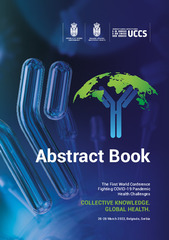Приказ основних података о документу
Gender Difference in SARS-CoV-2 Stimulation of Hyperinflammatory Response in Patients with COVID-19
| dc.creator | Mitrović-Ajtić, Olivera | |
| dc.creator | Subotički, Tijana | |
| dc.creator | Miljatović, Sanja | |
| dc.creator | Beleslin-Čokić, Bojana | |
| dc.creator | Čokić, Vladan | |
| dc.date.accessioned | 2024-02-02T11:25:51Z | |
| dc.date.available | 2024-02-02T11:25:51Z | |
| dc.date.issued | 2022 | |
| dc.identifier.isbn | 978-86-80916-01-9 | |
| dc.identifier.uri | http://rimi.imi.bg.ac.rs/handle/123456789/1456 | |
| dc.description.abstract | Background: Although women and men have the same prevalence, men with COVID-19 are more at risk for worse outcomes and death, independent of age. Methods: To observe the hyperinflammatory response regarding sex, we will measure the levels of inflammatory cytokines: interleukin-6 (IL-6), IL-1β, tumor necrosis factor-alpha (TNF-α), monocyte chemoattractant protein-1 (MCP-1), IL-10, interferon- gamma (IFN-γ), IL-8, transforming growth factor-beta 1 (TGF-β1), analyzed by ELISA, in plasma of 130 COVID-19 patients at diagnosis and correlate them with clinical parameters. Besides, we checked the quality of life of patients up to 3 months after hospitalization. Results: Pro-inflammatory IL-6 was significantly (p<0.01) increased in male COVID-19 patients compared to healthy male volunteers (4.7-fold) and female COVID-19 patients (1.75-fold). IL-6 was positively correlated to INR, aPTT (p<0.001), and ferritin (p<0.05), while INR with CRP (p<0.05). IL-8 was significantly increased in female COVID-19 patients compared to healthy female volunteers (p<0.01, 2.5-fold) and male COVID-19 patients (p<0.05). TNF-α was significantly (p<0.05) increased in male COVID-19 patients compared to healthy male volunteers. MCP-1 and IFN-γ were significantly increased in female COVID-19 patients compared to healthy female volunteers (p<0.01). Anti-inflammatory TGF-β1 was decreased in COVID-19 patients regardless of gender. Most patients were men (75%) with chronic disorders (59%, mostly hypertension). COVID-19 reduced their social (32%) and physical activities (34%) after 6 weeks of diagnosis, but further on reduced in additional 3 months (social 55%) with depression (22%). Conclusions: Inflammatory response is generally increased in COVID-19 patients with specific cytokines in accordance with gender. | sr |
| dc.language.iso | en | sr |
| dc.publisher | Belgrade: MEDAPP Association | sr |
| dc.rights | openAccess | sr |
| dc.source | The First World Conference Fighting COVID-19 Pandemic - Health Challenges, 26-28 March 2022, Belgrade, Serbia -Abstract book, 2022 | sr |
| dc.title | Gender Difference in SARS-CoV-2 Stimulation of Hyperinflammatory Response in Patients with COVID-19 | sr |
| dc.type | conferenceObject | sr |
| dc.rights.license | ARR | sr |
| dc.citation.epage | 95 | |
| dc.citation.spage | 95 | |
| dc.identifier.fulltext | http://rimi.imi.bg.ac.rs/bitstream/id/3430/Gender_Difference_in_SARS-CoV-2_con_2022.pdf | |
| dc.identifier.rcub | https://hdl.handle.net/21.15107/rcub_rimi_1456 | |
| dc.type.version | publishedVersion | sr |

